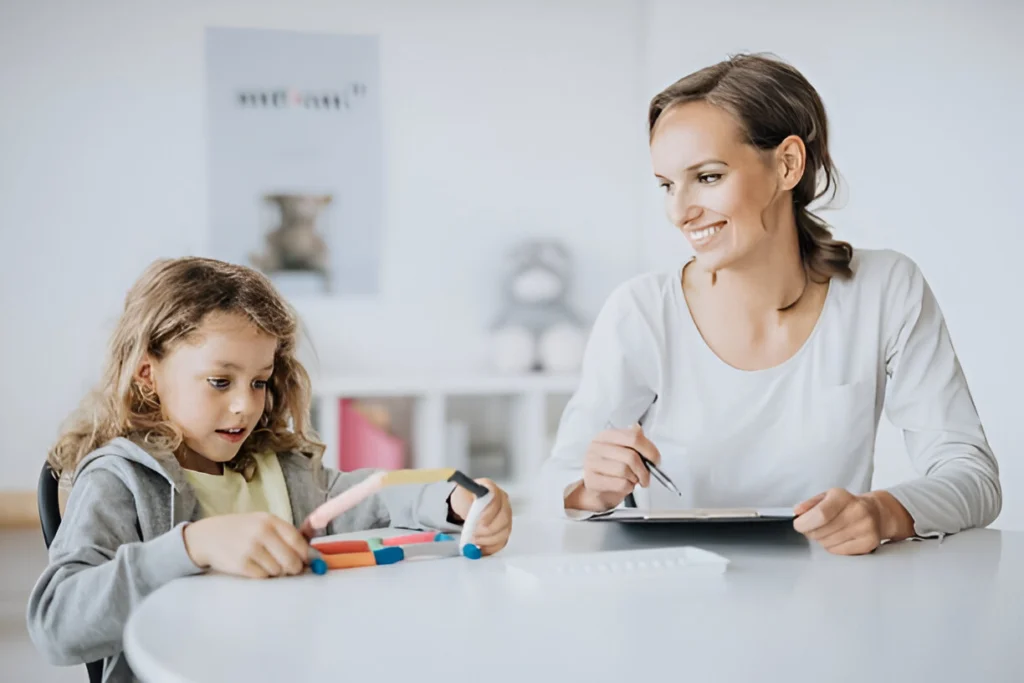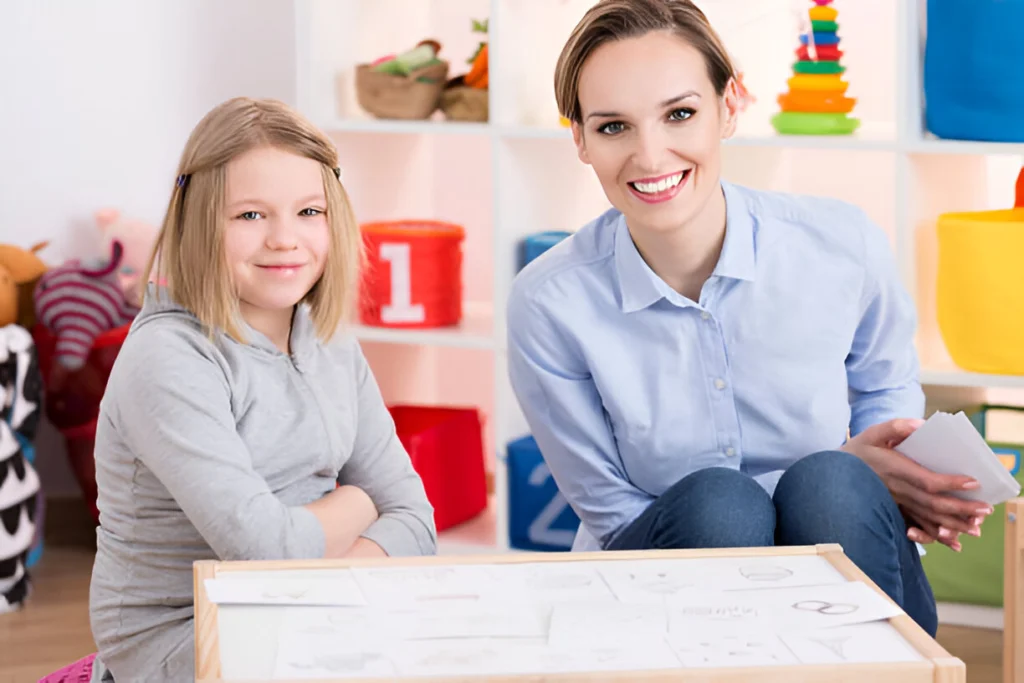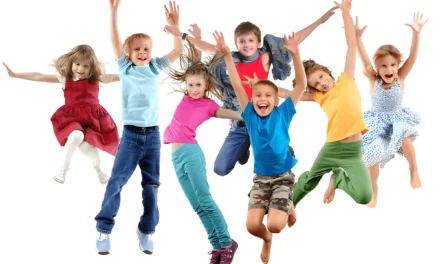Social development is how a child learns to interact with others. As they grow, they understand their own identity and how to communicate. This includes making friends and handling conflicts with peers. Studies show that everyday experiences with parents are key to a child’s social growth1. Parents give children their first chance to form relationships and learn how to interact.
As a parent, you show your child how to act around others every day. This is how they learn social skills.
Key Takeaways
- Parents are crucial in shaping a child’s social development from an early age.
- Everyday interactions and experiences with parents lay the foundation for a child’s social skills.
- Parents model appropriate social behaviors that children learn to mirror and apply.
- Supporting a child’s social development can impact their academic and personal success.
- Fostering strong social skills early on helps children navigate relationships and peer pressure as they grow.
Introduction to Social Development
Social development is how a child learns to interact with others2. They grow to understand themselves and how to talk to others. This growth affects many areas of a child’s life.
What is Social Development?
A child’s social skills are key to their success. From learning words as a toddler to handling peer pressure in high school, it all matters2. Good social skills help with language, self-esteem, and learning.
Importance of Social Development
Children start learning social skills at birth2. They grow in their relationships with family and culture2. Without these skills, they might struggle in school2.
Preschoolers learn by watching and playing with others2. They learn to share, communicate, and follow routines2. These skills are vital for their development.
Parental Roles in Social Development

As a parent, you are key to your child’s social growth3. Everyday moments with you help your child learn social skills. You give them their first chances to form relationships and communicate3. You also show them how to interact with others3.
It’s hard to grasp social development since it’s not talked about as much. This makes it tough for parents to see how their child is doing in this area3.
Having good social connections is vital for a child’s happiness3. Parents with strong social ties tend to raise their kids better. These connections help meet basic needs and reach goals3.
Children also gain from having friends and caring adults outside their family. This lets them try new things and find new interests3. Having many reliable adults in their life makes kids happier and more involved in their community3. Plus, families that are part of their community help their kids do well in school3.
Going to social events can be hard for some families. Programs help by offering transportation, meals, and flexible times3. This makes it easier for parents to help their kids make social connections3.
Your parenting style is shaped by your knowledge, attitudes, and practices4. Your beliefs and past experiences shape your attitudes. Your practices are based on how confident you feel as a parent4.
Contexts like your child’s traits, your experiences, and your social networks also play a part4. These factors influence how you parent4.
Your role in your child’s social development is very important34. By building positive relationships and showing healthy ways to interact, you help your child grow socially. This way, they can develop the skills needed to succeed34.
Promoting Healthy Relationships

As parents, you are key in teaching your kids about healthy relationships. Show them how to treat others with respect and kindness. This means making eye contact, speaking warmly, and understanding others’ feelings5.
Also, help your child learn to communicate well. Ask them to ask questions, share their feelings, and listen to others5. These skills are vital for making and keeping good friends6.
Modeling Positive Interactions
Children learn a lot from what they see their parents do. Show them what it means to be respectful, trustworthy, and good at talking5. You can practice this by acting out different social situations together6.
Encouraging Communication
Good communication is at the heart of any healthy relationship. Teach your child to share their thoughts and feelings openly5. Talk about the importance of body language and eye contact too6.
| Key Elements of a Healthy Relationship | Unhealthy Relationship Factors |
|---|---|
| Respect, trust, honesty about thoughts and feelings, and effective communication | Negative emotions, feelings of control, imbalance in attention, and lack of communication, trust, and respect |
By showing good examples and encouraging talking, you help your child grow up with the skills for lasting friendships56.
Social Skills
As kids grow, learning social skills is key for their happiness. These skills help them make friends and feel good about themselves. Parents are very important in teaching these skills, making kids confident and caring.
Developing Language Skills
Talking with others helps kids get better at speaking7. They learn to share their thoughts and feelings, and understand what others mean7. This makes them better at making friends and feeling connected.
Building Self-Esteem
Good social skills make kids feel proud of themselves8. When they feel at ease with others, they think more positively about themselves8. But, struggles in social situations can make them feel left out and unsure of themselves7. Parents can help kids feel more confident by teaching them how to interact well with others.
Teaching social skills takes time, patience, and knowing what each child needs7. By supporting these skills, parents help their kids succeed in making friends and growing up strong.
Early Childhood Social Development
Social development in early childhood is key for a child’s growth and happiness9. Infants show signs of emotional and social growth, like trying to talk to adults and understanding feelings9. Toddlers, aged one to three, start to be independent, show love, and play in a symbolic way.
Infant and Toddler Milestones
9 Preschoolers, aged three to five, play together, share, and understand emotions9. Early elementary kids, six to eight, care about others, laugh, and take care of things. These early stages help build social skills and emotional intelligence.
Parenting Tips for Infants and Toddlers
As a parent, you’re key in helping your child grow socially10. You teach by showing good behavior, praising good actions, and teaching empathy10. Toddlers need to learn to share and get along with others.
10 Teaching empathy and emotional intelligence is done by talking about feelings10. It’s important to address issues like anxiety and autism early to help your child.
10 Early experiences shape a child’s social and emotional growth11. Parents and caregivers play a big role in teaching these skills. Programs can also help build a strong foundation for success.
11 Kids with good social skills are more likely to go to college11. They’re more likely to graduate from high school11. They also use fewer illegal substances and get into less trouble11. Investing in your child’s early social-emotional development is crucial for their future.
Preschool Social Development
As children reach preschool age, their social skills grow12. They may play alone, show love openly, and work well with others12. Parents can help by showing love, helping them share feelings, and encouraging play with friends12. Setting up playdates and showing good relationships also helps their social skills.
Preschooler Milestones
12 Preschoolers learn to express feelings, share, be independent, and make friends12. At 3, they play make-believe, copy, notice friends, show love, and adjust to changes12. By 4, they explore new things, play creatively, and help friends12. At 5, they try to please friends, follow rules, and show independence.
Parenting Tips for Preschoolers
13 Teaching kids to share, listen, and follow directions is key13. Encourage teamwork, patience, and expressing ideas13. Also, teach empathy, respect, and stay positive to help their social skills grow.
- 14 Kids learn to share quickly in preschool.
- 14 Preschools that focus on social skills help kids succeed later.
- 14 Preschoolers think of more solutions than non-preschoolers.
- 14 Making friends early helps kids socially as they grow.
12 Preschoolers learn about relationships, self-awareness, and controlling emotions12. Emotional literacy helps them solve problems and manage feelings12. They learn this through adults and supportive preschool environments.
| Preschool Social Development Milestones | Age 3 | Age 4 | Age 5 |
|---|---|---|---|
| Emotional Expression and Regulation | Engage in make-believe play, copy others, show emotions, adapt to routine changes | Show interest in new experiences, engage in creative play, comfort or cooperate with friends | Aim to please and emulate friends, follow game rules, exhibit independence |
| Peer Interaction and Relationships | Notice peers, express affection | Play with others, differentiate between real and imaginary | Take turns, know personal information |
| Self-Awareness and Independence | Explore independently | Engage in creative play | Do chores, understand real versus imaginary |
12 Milestones in social-emotional development vary by culture and family12. Kids learn by watching and imitating others in their families and communities.
School-Age Social Development
As kids get older, they start to form friendships and learn about power in groups15. Parents can help by talking about friends, solving problems, and discussing bullying. Keeping the lines of communication open and being supportive is key.
Milestones for School-Age Children
Children’s social skills grow in a predictable way16. It’s important to watch for these milestones during health check-ups16. They start to compete more and may find it hard to make friends or work together15. Parents can guide them through these challenges and help them learn important skills.
- Parents should limit fast food and offer healthy meals to avoid obesity15.
- Accidents, drowning, and burns are big dangers for kids this age15.
- When kids outgrow car seats, they need booster seats until seat belts fit15.
- Using phones or listening to music can distract kids from dangers15.
- Teaching kids to swim and water safety is vital, especially near water15.
By being involved in their kids’ lives, parents can build strong relationships15. Going to events and volunteering together can make these bonds even stronger15.
Dealing with social issues in school can be tough, but with parental support, kids can do well. The Virtual Lab offers great advice for parents to help their kids grow socially and emotionally.
Fostering Positive Social Connections
As a parent, you are key in helping your child make good friends. One great way is by encouraging them to follow their17. When kids do things they love, they feel more at ease with others17. This helps them feel part of a group and learn important social skills.
Supporting your child’s hobbies is also important. Teaching them to be empathetic is another great way to help18. Empathy lets them understand and share feelings, making friendships deeper18. By being empathetic yourself and teaching your child, they’ll handle social situations better.
Following Child’s Interests
- Encourage your child to pursue hobbies and activities they genuinely enjoy.
- Provide opportunities for your child to engage with peers who share similar interests.
- Attend your child’s extracurricular events to show your support and interest.
- Celebrate your child’s achievements and successes, no matter how small, to boost their confidence.
Teaching Empathy
- Model empathetic behavior by showing your child how to understand and respond to the emotions of others.
- Encourage your child to practice active listening and consider different perspectives.
- Teach your child to recognize and express their own emotions, which can help them better understand the emotions of others.
- Encourage your child to engage in acts of kindness and consider the needs of their peers.
“Fostering positive relationships during the early years is crucial for the acquisition of social skills.”17
By supporting your child’s hobbies and teaching empathy, you create a caring space. This space helps your child make good friends and succeed in social skills171819.
Role-Playing Social Scenarios
Engaging in role-playing exercises is a great way for parents to help their kids practice social skills. By acting out different roles, kids learn how to handle social situations better. Parents can offer feedback and tips to improve their communication and problem-solving skills20.
Role-play is a safe space for kids to practice talking and social skills. It helps them understand others better and solve problems21. It’s good to keep role-play short, around 5 to 10 minutes, for a focused practice21. Using too many costumes and props can distract from the main goal21.
It’s best to focus on positive scenarios in role-play to avoid teaching bad habits21. Giving feedback right after helps kids learn faster21. Encourage them to think about their social skills use during breaks like recess or lunch21.
The Solution Wheel strategy helps kids solve problems in a respectful way21. Real-life situations approach guides them to find solutions by asking questions and encouraging their efforts21. Problem-solving cards help them think of new ways to handle social situations by considering different options21.
Through these role-playing activities, kids become more confident in dealing with others2021.
Understanding Child’s Social Limits
Every child is different when it comes to social needs and abilities. Some kids prefer smaller groups, while others enjoy being around more people. Respecting a child’s social limits helps them feel more confident and can help them learn to interact with others better over time22.
Young kids, like babies and toddlers, start learning basic social skills like smiling and making eye contact22. But as they get older, especially in middle school, their social and emotional skills change a lot. Tweens and young teens, aged 11 to 13, often focus more on their friends and can be more moody23.
- Adolescents around puberty might believe they’re famous in their own minds and think they’re invincible, which can make social interactions tough23.
- They’re also going through big changes, wanting more freedom and sometimes acting out23.
- Unfortunately, they might also start to bully others, which can hurt their social growth23.
By respecting a child’s social limits and creating a supportive space, parents can help them deal with these challenges. Building a strong family foundation of respect and equality helps kids feel more confident and able to handle social situations24.
| Age Group | Social Milestones |
|---|---|
| Infants and Babies | Smiling, looking at caregivers, crying to have needs met, self-soothing by sucking on hand or fingers |
| Toddlers and Preschoolers | Imitating facial expressions, smiling more spontaneously, developing awareness of surroundings, engaging in pretend play, and engaging in side-by-side play with other children |
| Elementary School-Age Children | Being more aware of following rules, enjoying cooperative play, understanding embarrassment, comprehending others’ feelings, expanding emotional vocabulary, demonstrating sportsmanship, and developing their own identity |
Understanding a child’s social limits and supporting them helps them develop good social skills. This way, they can handle the ups and downs of growing up with confidence22.
Parental Role Modeling
Parents are the main role models for kids, shaping their social growth25. Watching parents helps kids learn important social skills25. Kids are more likely to act positively if they see it in their parents25.
Studies show that parents’ actions improve empathy and communication in kids25. Good communication and problem-solving skills grow when parents model them25. Kids learn social skills best when parents consistently show them25.
It’s key to give kids chances to practice and get feedback on their skills25. Teachers also play a big role in teaching social skills by being good examples25. Parents are crucial in teaching kids social skills25.
Getting help from experts, like speech therapists, can really help kids improve their social skills25. Learning from different role models helps kids see different views and challenge their own biases.
Being a Positive Example
Parents can show kids how to interact positively by making eye contact and being kind26. A 2017 study found that parents are the top role models for kids26. Kids also look up to relatives, teachers, and even celebrities for guidance26.
But, kids can also learn from bad examples. Some famous people make choices that kids might follow.
Conscious Effort in Interactions
Parents need to be aware of how they interact with others, as kids learn from these examples26. It’s important to talk about who kids admire and why26. Discussing positive role models helps kids make better choices26.
Parents should also talk about mistakes made by role models26. This teaches kids the value of learning from errors26. Encouraging kids to join activities that match family values helps them grow positively26.
It’s okay for kids to be themselves while learning from others26. If a role model’s influence is bad, getting help from a mental health expert might be needed26.
Developing Social Skills Takes Time
Building strong social skills is a slow, long-term journey. It needs patience and hard work from kids and their parents27. There’s no quick fix for social problems27. It takes time and effort to see real changes27.
Some people might see big improvements in a year27. But for most, it takes one to three years to notice big changes27. Knowing this can help keep kids motivated and avoid getting discouraged27.
Improving social skills means getting better at talking, listening, and understanding others28. Kids can practice these skills in groups, online, and through activities28. This helps them make friends, feel more confident, and handle tough emotions28.
The pace of getting better at social skills varies based on how hard kids try, what resources they have, and what else they’re doing27. But with a positive attitude and knowing it’s a lifelong journey, parents can support their kids29.
Learning to understand and manage emotions is key for getting along with others29. Parents can teach kids these skills. This helps them make friends and do well in social situations29.
“Social skills are often considered a ‘learn on the job’ skill, with individuals taking a lifetime to refine them.”29
Remember, improving social skills is a long-term process that needs ongoing effort and support27. By being supportive, encouraging practice, and showing good social behavior, parents can help their kids do well in relationships28.
Community Resources for Social Skills
Parents can get help from community resources to improve their kids’ social skills. Places like social skills classes, after-school programs, sports teams, and local groups are great. These spots offer a place for kids to work on talking, teaming up, and solving problems in a safe setting.
The Social Skills Improvement System (SSIS) is a tool that checks social skills and problem behaviors in kids and teens30. The Autism Diagnostic Observation Schedule (ADOS) helps figure out if someone might have autism by looking at how they talk and interact30. The Social Responsiveness Scale (SRS) gives a detailed look at social skills and how well someone can connect with others30.
Playing music together in games can make kids better at socializing31. Being part of a team sport teaches kids to work together and handle their feelings31. Gardening can teach kids about caring for something and being part of a community31.
For kids with special needs, games like Step Into Conversation help them learn to talk, feel for others, and be polite31. Games that involve making choices can teach kids to keep trying, think carefully, and work together31.
Looking into community resources can give kids more chances to learn and use important social skills. These skills are key for their future success.
Conclusion
As parents, you are key in shaping your child’s social skills. These skills are vital for their success in life. By showing good examples, encouraging healthy relationships, and giving chances to practice, you lay the groundwork for their future connections32.
Keep in mind, building social skills takes time. With your patience and the help of your community, your child will keep growing in their social interactions33. Being involved in this process not only helps your child but also strengthens your family’s ties and improves everyone’s well-being.
Starting this journey, remember the big role you play in your child’s social skills. Your support and dedication will prepare them to make lasting connections, communicate well, and become confident, caring people.






Can I just say what a relief to find somebody who actually knows what theyre speaking about on the internet. You positively know the best way to deliver a difficulty to light and make it important. More folks need to read this and understand this aspect of the story. I cant believe youre no more common since you positively have the gift.